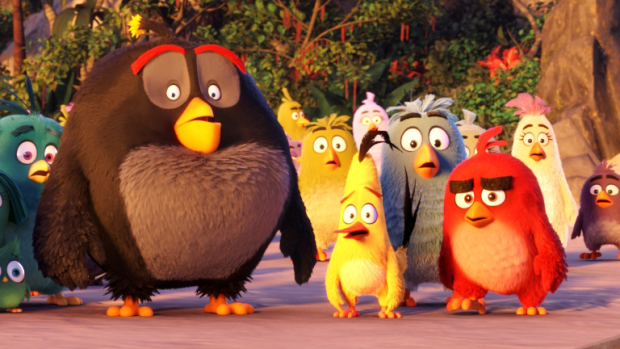
The box office is chirping, people.
It’s chirping at you now. Hopefully, you’re paying attention.
The top movie of the weekend was Angry Birds, which took in 39 million worms. This film represents everything that Hollywood wants in a project. Established IP. Something that can sell toys. Something that plays to all audiences.
Unfortunately, it doesn’t help the average screenwriter understand what they should be writing, since established IP is off-limits. If pushed for a lesson here, I’d say that the more age groups your screenplay plays to, the more appealing it will be to a producer, assuming it’s a good idea and well-written.
But what multi-demo genres are left that aren’t dominated by the IP market? I can think of three. Studios will always be looking for a good adventure script along the lines of Raiders of the Lost Ark. They’re always looking for that supernatural or sci-fi comedy type script (think MIB or Ghostbusters). And everyone’s STILL looking for the next Goonies, 25 years later. Kathleen Kennedy says that of the 30 huge movies she’s made, that’s still the one she gets asked about the most. So something in that vein is still available to spec writers. I would caution though that you better bring your A-Game cause I’ve read all the attempts from writers of these scripts and outside of Roundtable, they’re painfully generic. You have to find a new way into these ideas.
The second big release of the weekend is Neighbors 2, which brought in 21 million, along with some more relevant advice for screenwriters. Comedy still represents one of the best chances for an unknown screenwriter to break into the industry and earn millions of dollars quickly. Come up with a smart (preferably ironic) comedy idea, sell it, and when it does well, reap the benefits of its subsequent sequels.
That brings us to the most complicated major release of the weekend, The Nice Guys. The Nice Guys is the screenplay that serious screenwriters believe there should be more of. It doesn’t fit into any genre or even sub-genre. It’s unique. It’s fresh. But nobody went to see it, including, I’m betting, a lot of the screenwriters who say there need to be more movies like it.
This is the hypocrisy that bothers me about the anti-Hollywood crowd. They cry foul when their weird anti-narrative screenplay doesn’t get noticed. I then ask them if they’ve seen [latest low-profile indie movie] and their answer is almost universally “no.”
So if they’re not paying to see the few anti-Hollywood movies that DO make it through the system, why in the world would they expect anyone to do the same for their movie? It becomes painfully clear that they’re not supporting unique films. They’re supporting THEIR unique film.
This problem permeates a huge swath of the screenwriting community. They think they’re different, that they’re special, that their weird little script is somehow going to be the one that everybody goes to see. When a movie that has one of the biggest movie stars in the world, Ryan Gosling, promoting the hell out of it, and was still barely able to make 10 million dollars, you have to understand that THAT’S why studios are so terrified to take chances on offbeat little films like this.
I mean answer this question seriously. Would you have put up your money for The Nice Guys?
Another major spec release was last weekend’s Money Monster, a film that represents a key issue with the spec market at the moment, and why fewer and fewer of these movies are doing well. A spec script is meant to keep a reader’s attention from start to finish. There can’t be any slow parts.
This necessitates such things as a HUGE idea, tons of urgency, and heightened variables – all things designed to keep a bored reader awake. Unfortunately, this isn’t necessarily a recipe for a great film. A great film creates some sort of emotional connection with the audience.
And emotion requires things that lie in opposition to a reader-friendly script: Character development, relationship development, the occasional slowing down of the narrative. None of those things play well on the page unless you really know what you’re doing.
As a result, we get movies like Money Monster, which at one point in time would’ve had a 30 million dollar opening. Now, with a major effects-driven film to compete with every week, the script needs to do more than merely move. It needs to move the audience. And the “Max Landising” of this craft discourages against that.
The most successful spec story of the year is Cloverfield Lane (remember that it was originally a spec script before they turned it into a Cloverfield film). The 70 million dollar grossing contained horror flick managed to strike the perfect balance between a tight urgent story and characters with some actual meat to them. This allowed us to feel some emotion, which helped strike the perfect balance between “event” and “experience” so many spec screenplays lack these days.
Look, moving fast to please a reader while slowing down to move a reader is always going to be a challenge. You’re literally incorporating things that work in direct opposition to one another. But that’s why the screenwriters who carve out careers in this industry get paid so much, because they’re able to find that balance. Keep that in mind as you’re writing your “Scriptshadow Write a F%$&ing Screenplay” scripts.
Make sure to tune in next Monday as we’ll be revealing the Top 5 scripts in the Scriptshadow 250 Screenwriting Contest, held in conjunction with Grey Matter. We’ve already begun to contact the finalists. And for the winner, it’s probably going to change their lives. So can’t wait to finally share!


